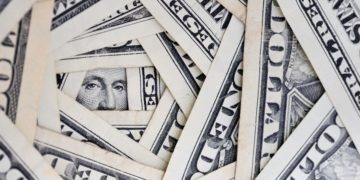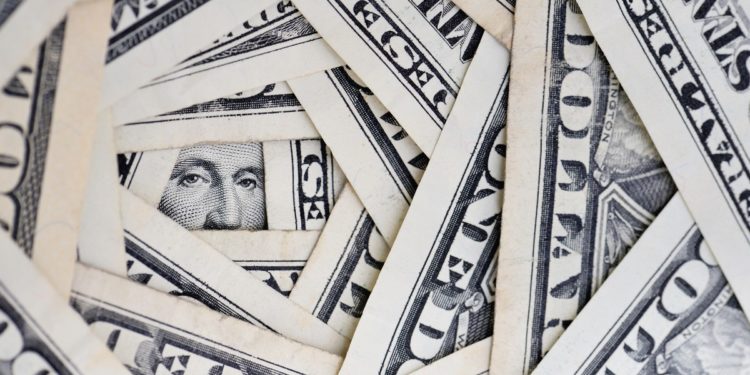This is an edition of The Atlantic Daily, a newsletter that guides you through the biggest stories of the day, helps you discover new ideas, and recommends the best in culture. Sign up for it here.
Americans are feeling anxious about the economy. Amid all the questions—is a recession looming? Will President Trump’s tariffs cause a spike in prices?—one not-so-reassuring prospect exists: You can pay for sandwiches in installments.
Last week, the financial-services start-up Klarna announced that it was partnering with the delivery company DoorDash to allow customers to pay off orders in four parts. Deferred-payment services, once used largely to finance major purchases such as couches or Pelotons, have been expanding into the realm of the day-to-day in recent years, as the companies grow (and in Klarna’s case, eye an IPO). On an internet attuned to #recessionindicators, the memes began to flow, as many noted the absurdity of financing, say, a burrito. (Klarna clarified in a blog post that the feature could be used for purchases of at least $35, and a spokesperson told me that the partnership was intended more for purchasing bigger-ticket items such as home goods and electronics than for use on food delivery. DoorDash has emphasized the same.)
Some 14 percent of Americans had used buy-now, pay-later services (known as BNPL), such as Klarna, Affirm, and Afterpay, in the year leading up to fall 2023, one estimate found. The services effectively offer interest-free loans and do not generally require a credit check. In 2019, people bought about $2 billion worth of goods with the apps, and in 2023, it was closer to $34 billion. The Consumer Financial Protection Bureau found that the bulk of BNPL transactions in 2022 were for purchases of less than $100. These arrangements, tempting as they are, come with risks: They run parallel to the traditional credit-card system but lack all of the same protections.
Credit cards are required to follow the Truth in Lending Act, which provides consumer protections such as notices on rate increases and the right to dispute charges—and they allow users to build up their credit when they pay off batches of purchases at once. The idea of paying off a single deferred-payment loan may, on its face, seem simpler than opening a credit card. But what often ends up happening with these services, Ed deHaan, a professor at Stanford’s business school, told me, is that users (many of them young people) who are not in the habit of paying off debt take out several of these loans at once. Keeping track of eight or 10 smaller loans with different deadlines can quickly become overwhelming.
On average, deHaan has found, people using BNPL services are more likely to overdraft their bank account than nonusers (suggesting they are spending beyond their means). And another study found that using the services causes spending to rise by $60 a week. Many regular users of the services are those who have already racked up credit-card debt, and turn to deferred payments as a last resort. As Mac Schwerin wrote in The Atlantic in 2023, “What companies like Klarna once characterized as paradigm-busting behavior—young people rejecting stodgy banks in favor of more freeing forms of finance—now looks like the crest of yet another credit cycle, a familiar note in the motif of American consumption.” Klarna told me that it has “a number of safeguards to ensure responsible lending and consumer protection,” and in a follow-up statement noted that it welcomes “proportionate” rules, arguing that “the CFPB’s previous attempts at this were a step in the right direction but they ultimately failed to recognise what BNPL is.”
The Consumer Financial Protection Bureau has only just started to scrutinize the young BNPL sector. Last May, the agency announced that deferred-payment programs would be treated like credit cards in some key ways: Borrowers would be able to dispute charges and be more easily able to get refunds, among other protections (some but not all aspects of the Truth in Lending Act applied). Rather than issuing new regulations for the BNPL sector, the CFPB ruled that the spirit of existing credit-card laws covered the newer industry—a bold move, deHaan argued when we talked earlier this week, and one that was challenged in court. On Wednesday, a court filing suggested that the CFPB would revoke the rule. (The Consumer Financial Protection Bureau did not immediately respond to a request for comment.)
Although the big BNPL lenders such as Klarna have signaled that they are open to some regulation, the U.S. lags behind Europe in its regulations on the services. The major players face public pressure to operate scrupulously, deHaan noted. The bigger risk to consumers may now come from the smaller, less popular loan companies that can crop up and take advantage of reduced scrutiny.
The deferred-payments sector seems, on paper, like just the kind of issue the Consumer Financial Protection Bureau was set up to handle: The agency, which was formed after the 2008 financial crisis, has the mandate to monitor new financial products that may confuse consumers. But in recent months, the agency has been gutted. In February, the entire 1,700-person workforce was sent home (Elon Musk posted “CFPB RIP” on X), and the agency was ordered to pause rule making. A judge is set to decide soon whether firings of probationary workers are legal; in the meantime, some workers have been brought back. And earlier today, another judge issued an injunction to temporarily stop the Trump administration from dismantling the agency, saying that the court “can and must act” to preserve it.
The judge’s ruling brings the agency back from the brink for now. The BNPL industry is one that, in another political era, the CFPB may have been eager to address. And if the agency survives, it still could. But the chaos—and the fact that the administration has attacked it—may ultimately render it less equipped to protect the public.
Related:
- The “Buy now, pay later” bubble is about to burst.
- Why is there financing for everything now? (From 2020)
Here are three new stories from The Atlantic:
- The double standard at the center of the Signal debacle
- David Frum: Why Sheinbaum can surrender to Trump
- The truth about Trump’s Greenland campaign
Today’s News
- More than 150 people were killed, and more than 730 were injured, after a 7.7-magnitude earthquake struck Myanmar. Buildings collapsed in Thailand from the quake, killing at least 10 people in Bangkok.
- During Vice President J. D. Vance’s Greenland visit, he said that the country’s people would be better off under America’s security umbrella than Denmark’s.
- The Justice Department filed an emergency appeal to the Supreme Court, seeking approval for President Donald Trump to deport people under the Alien Enemies Act.
Dispatches
- Atlantic Intelligence: Damon Beres interviews Ian Bogost about the AI-generated Studio Ghibli images that have taken the internet by storm.
- The Books Briefing: We surveyed more than 400 writers, readers, and editors to assemble a rich array of works. Here is the best American poetry of the 21st century (so far).
Explore all of our newsletters here.
Evening Read
The Pitt Has Revolutionized the Medical Drama
By David Sims
Medical dramas are like the old aphorism about pizza and sex: Even when they’re bad, they’re still pretty good. Since the glory days of ER faded in the late ’90s, there have been plenty of TV series of varying quality set in hospitals … I had been longing for something more meat-and-potatoes—and then along came The Pitt, Max’s hit new show starring ER’s Noah Wyle. The first season is still airing, yet it’s already without question the finest example of the genre in more than a generation.
More From The Atlantic
- Texas never wanted RFK Jr.’s unproven measles treatment.
- The NIH’s most reckless cuts yet
- The retired J.P. Morgan executive tracking Trump’s deportation flights
- Why DOGE could actually increase the deficit
- Job loss is a kind of grief.
- Canada’s military has a Trump problem.
Culture Break
Take a look. These photos of the week show a Tyrannosaurus race, a raccoon snack, anti-Hamas protests in Gaza, Nowruz celebrations in Iraq, and more.
Read. Michelle de Kretser’s intellectual coming-of-age novel explores the fissures between one’s ideals and reality.
Stephanie Bai contributed to this newsletter.
When you buy a book using a link in this newsletter, we receive a commission. Thank you for supporting The Atlantic.
The post The Risk of Financing Your Errands appeared first on The Atlantic.



















